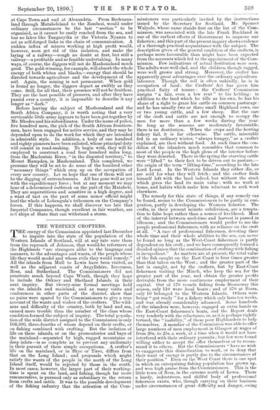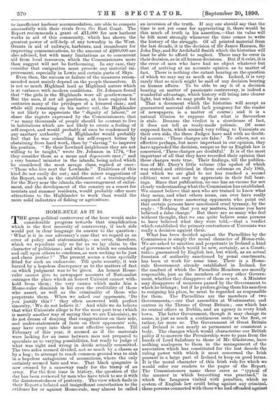THE WESTERN CROFTERS. T HE energy of the Commission appointed last
December to inquire into the state of the population of the Western Islands of Scotland, will at any rate save them from the reproach of Johnson, that would-be reformers of the Highlands "are strangers alike to the language and manners, to the advantages and wants, of the people whose life they would model and whose evils they would remedy." All the islands from Mull to Lewis have been visited, as well as the adjacent coasts of Argyllshire, Inverness, Ross, and Sutherland. The Commissioners did not penetrate much beyond Cape Wrath, though they hope to include the Orkney and Shetland Islands in their next inquiry. But twenty-nine formal meetings held on the, islands and mainland, and as many visits and conferences in other parts of the district, show that no pains were spared by the Commissioners to give a true account of the wants and wishes of the crofters. The wild- ness and difficulty of the country, both by land and sea, caused more trouble than the number of the class whose condition formed the subject of inquiry. The total popula- tion of the wide district assigned to the Commission is only 108,500, three-fourths of whom depend on their crofts, or on fishing combined with crofting. But the isolation of life on these islands, or on the promontories and bays of the mainland—separated by high, rugged mountains or deep inlets—is so complete as to prevent any uniformity in their pursuit of these simple occupations. A crofter's life on the mainland, or in Skye or Tiree, differs from that on the Long Island ; and proposals which might satisfy the wants of the people in the north of the Long Island itself, would be rejected by those in the south. In most cases, however, the larger part of their working- time is spent on the land, and fishing, though far more remunerative, is pursued only as subsidiary to the return from crofts and cattle. It was to the possible development of the fishing industry that the attention of the Cora- missioners was particularly invited by the instructions issued by the Secretary for Scotland. Mr. Spencer Walpole, whose name stands first on the list of the Com- mission, was associated with the late Frank Buckland in one of the earliest efforts of Government to improve our fisheries ; and this part of the present inquiry shows evidence of a thorough practical acquaintance with the subject. The description given of the general condition of the crofters, is perhaps more favourable than might have been expected from the accounts which led to the appointment of the Com- mission. Few indications of actual destitution were seen. The adults were well clad, and the children, though ragged, were well grown and strong. Moreover, the crofter has apparently great advantages over the ordinary agricultura labourer. Though the soil is often unkindly, he is in occupation of land : the Crofters' Act has given him practical fixity of tenure : the Crofters' Commission assigns "a fair, even a low rent" to his holding : in addition to the land which he tills as his own, he has his share of a right to graze his cattle on common pasturage : and he has usually two or three small Highland cows, one or two young cattle, and a few sheep. But the care of the croft and cattle are not enough to occupy the men for more than a few weeks during the year. So long as the seasons are moderately favourable, there is no destitution. When the crops and the herring fishery fail, it is far otherwise. The cattle, miserably fed in an ordinary winter, "always hungry," as a crofter explained, are then without food. At such times the con- dition of the islanders much resembles that common to most of the people in the high glens of the interior before they were deserted. There in the spring the starving cattle were "lifted" to their feet to be driven out to pasture,— the origin of the term "lifting-time," according to the late Lord Lovat. In the Western Islands they either die, or are sold for what they will fetch ; and the crofter finds himself left with the land indeed, but without the stock which gives the land its main value ; with no work at home, and habits which make him reluctant to seek work elsewhere.
The remedy for this state of things, if any remedy can be found, seems to the Commissioners to be partly in emi- gration, partly in developing the Western fisheries. The crofts, in their present minute subdivision, are a tempta- tion to false hope rather than a source of livelihood. Most of the interval between seed-time and harvest is passed in idleness ; and the Commissioners would prefer to see the people professional fishermen, with no reliance on the croft at all. "A race of professional fishermen, devoting their whole time and their whole abilities to the sea, can never be found so long as the West-Coast fisherman is partly dependent on his croft ; and we have consequently formed a decided opinion that the combination of crofting with fishing is inexpedient." As matters are at present, the total value of the fish caught on the East Coast is four times greater than that taken on the West ; and the greater part of the last is caught, not by the crofters, but by East-Coast fishermen visiting the Minch, who keep the sea for the greater part of the year, and obtain the greater profits derivable from the more continuous employment of their capital. Out of 570 vessels fishing from Stornoway this season, only 110 were local boats ; and of 370 at Barra, only 16 belonged to the Western Islands. Others were being "got ready "for a fishery which only lasts ten weeks, and was already considerably advanced. Some hundreds of the islanders were, however, engaged as extra hands on the East-Coast fishermen's boats, and the Report deals very tenderly with the reluctance, or, as it is perhaps rightly termed, the "inability," of these poor Highlanders to help themselves. A member of the Commission was able to offer large numbers of men employment in Glasgow at wages of from 20s. to 25s. a week, at a time when it would not have interfered with their ordinary pursuits ; but few were found willing either to accept the offer themselves or to recom- mend it to others. But the Commissioners "have no wish to exaggerate this disinclination to work, or to deny that their want of energy is partly due to the circumstances of their position." Even on the West Coast there is one spot in which an enterprising fishing population has grown up, and won high praise from the Commissioners. This is the little town of Ness, in the extreme north of Lewis. There a hardy, industrious, and skilful body of professional fishermen exists, who, though carrying on their business under circumstances of great difficulty and danger, owing to insufficient harbour accommodation, are able to compete successfully with their rivals from the East Coast. The Report recommends a grant of £11,000 for new harbour works in aid of this community, which has shown the greatest power of self-help of any township in the West. Grants in aid of railways, harbours, and steamboats for improving communications, to the amount of £280,000 are also advised, but with many limitations as to concurrent aid from local resources, which the Commissioners more than suggest will not be forthcoming. In any case, they consider that emigration must precede any material im- provement, especially in Lewis and certain parts of Skye. Even then, the success or failure of the measures recom- mended must mainly depend on the people themselves. It is not so much Highland land as Highland nature which is at variance with modern conditions. Dr. Johnson found that "the girls in the Highlands were all gentlewomen." But the men, if not all gentlemen, at least enjoyed for centuries many of the privileges of a leisured class ; and while still remaining on his native soil, the Highlander is not likely to appreciate the "dignity of labour," or share the regrets expressed by the Commissioners, that " so many thousands of people should be content to live in habitations which are not likely to create a feeling of self-respect, and would probably at once be condemned by any sanitary authority." A Highlander would probably feel that he was consulting his self-respect better by abstaining from hard work, than by " slaving " to improve his position. "By their Lowland neighbours they are not willing to be taught," wrote Dr. Johnson in 1774, "for they consider them as a mean and degenerate race ;" and a very learned minister in the islands, being asked which he considered the most savage clans, replied at once : " Those who live next the Lowlands." Traditions of this kind do not easily die out ; and the minor suggestions of the Report, such as the establishment of a training-ship for the Navy near the islands, the encouragement of enlist- ment, and the development of the country as a resort for tourists and summer residents, would probably offer more attractions to the Highlander to work than would the more solid industries of fishing or agriculture.



































 Previous page
Previous page